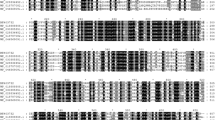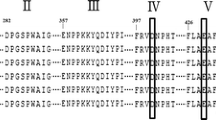Abstract
Cloning and expression of the α-amylase gene (AmyK2) of thermophilic Bacillus subtilis k2cm originated from Yume Samdong hot spring, North Sikkim, India was done in Escherichia coli BL-21(DE3). The 55.0 kDa purified recombinant enzyme exhibited optimum activity at 70 °C and pH 7.0 with significant stability in temperature and pH ranges from 30 to 90 °C and 6.0–8.0, respectively. The α-amylase is Ca+ 2 independent, and can act with reasonably high efficiency in absence of any metal. Moreover, its activity increased in the presence of Fe+ 2 ion and was inhibited by Hg+ 2 ion and EDTA. The recombinant enzyme showed a half-life of 53 min at 70 °C and its Vmax and Km values were 22.22 U/mg and 5.06 mg/ml, respectively. Immobilization of the purified enzyme on low-cost coconut coir with high immobilization yield (98.27% specific activity), increased half-life (71 min), and higher thermostability with successive use up to 8 cycles with high efficacy validates the techno-economic merit of use of the immobilized biocatalyst. As a whole, cloning the α-amylase gene of thermostable bacteria into the mesophilic organism and subsequent immobilization of the enzyme will unravel its secrets within the confines of the laboratory which could expedite its commercial exploitation in future.
Graphical abstract

Highlights of the Study
-
• The recombinant α-amylase AmyK2 is highly thermotolerant, stable in a wide range of pH and Ca+ 2 independent enzyme.
-
• The enzyme having low Km for starch; therefore, it exhibits high affinity for any starchy substrate.
-
• The enzyme was successfully immobilized at its native state with coconut coir and effective after successive reuse.








Similar content being viewed by others
References
Sharma P, Mondal K, Mondal KC, Thakur N. Hunt for α-amylase from metagenome and strategies to improve its thermostability: a systematic review. World J Microbiol Biotechnol. 2022;38(11):203.
Mondal S, Mondal K, Halder SK, Thakur N, Mondal KC. Microbial Amylase: Old but still at the forefront of all major industrial enzymes. Biocatal Agric Biotechnol. 2022;102509.
Jana M, Maity C, Samanta S, Pati BR, Islam SS, Mohapatra PKD, Mondal KC. Salt-independent thermophilic α-amylase from Bacillus megaterium VUMB109: an efficacy testing for preparation of maltooligosaccharides. Ind Crops Prod. 2013;41:386–91.
Mondal S, Soren JP, Mondal J, Rakshit S, Halder SK, Mondal KC. Contemporaneous synthesis of multiple carbohydrate debranching enzymes from newly isolated Aspergillus Fumigatus SKF-2 under solid state fermentation: a unique enzyme mixture for proficient saccharification of plant bioresources. Ind Crops Prod. 2020;150:112409.
Sindhu R, Binod P, Madhavan A, Beevi US, Mathew AK, Abraham A, Pandey A, Kumar V. Molecular improvements in microbial α-amylases for enhanced stability and catalytic efficiency. Bioresour Technol. 2017;245:1740–8.
Gangadharan D, Jose A, Nampoothiri KM. Recapitulation of stability diversity of microbial α-amylases. Amylase. 2020;4(1):11–23.
Das S, Najar I, Sherpa MT, Thakur N. Hot Springs of Sikkim: Biotechnological and sociological importance. Research on Biotechnology in India: some initiatives and accomplishments. New Delhi, India: New India Publishing Agency; 2016. 149– 81.
Najar IN, Sherpa MT, Das S, Das S, Thakur N. Microbial ecology of two Hot Springs of Sikkim: predominate population and geochemistry. Sci Total Environ. 2018;637:730–45.
Gomes E, AR deS, GL O, R DS, TB deO, A R. Applications and benefits of thermophilic microorganisms and their enzymes for industrial biotechnology. Gene Expression Syst fungi: Advancements Appl. 2016;459:92.
Mohamad NR, Marzuki NH, Buang NA, Huyop F, Wahab RA. An overview of technologies for immobilization of enzymes and surface analysis techniques for immobilized enzymes. Biotechnol Biotechnol Equip. 2015;29(2):205–20.
Samanta S, Jana M, Maity C, Kar S, Mohapatra PK, Pati BR, Mondal KC. The potential of immobilized bacterial α-amylase on coconut coir, a smart carrier for biocatalysts. Biocatal Biotransform. 2009;27(2):131–5.
de Castro HF, de Lima R, Roberto IC. Rice straw as a support for immobilization of microbial lipase. Biotechnol Prog. 2001;17(6):1061–4.
Najar IN, Sherpa MT, Das S, Thakur N. Bacterial diversity and functional metagenomics expounding the diversity of xenobiotics, stress, defense and CRISPR gene ontology providing eco-efficiency to Himalayan Hot Springs. Funct Integr Genomics. 2020;20:479–96.
Saitou N, Nei M. The neighbor-joining method: a new method for reconstructing phylogenetic trees. Mol Biol Evol. 1987;4(4):406–25.
Erickson K. The jukes-cantor model of molecular evolution. Primus. 2010;20(5):438–45.
Tagomori BY, Dos Santos FC, Barbosa-Tessmann IP. Recombinant expression, purification, and characterization of an α-amylase from Massilia timonae. 3 Biotech. 2021;11(1):13.
Caruso CS, de Fátima Travensolo R, de Campus Bicudo R, de Macedo Lemos EG, de Araújo AP, Carrilho E. α-Hydroxynitrile lyase protein from Xylella fastidiosa: Cloning, expression, and characterization. Microb Pathog. 2009;47(3):118–27.
Classics Lowry O, Rosebrough N, Farr A, Randall R. Protein measurement with the Folin phenol reagent. J biol Chem. 1951;193(1):265–75.
Mukherjee R, Paul T, Soren JP, Halder SK, Mondal KC, Pati BR, Das Mohapatra PK. Acidophilic α-amylase production from Aspergillus Niger RBP7 using potato peel as substrate: a waste to value added approach. WASTE BIOMASS VALORI. 2019;10:851–63.
Hmidet N, Bayoudh A, Berrin JG, Kanoun S, Juge N, Nasri M. Purification and biochemical characterization of a novel α-amylase from Bacillus licheniformis NH1: cloning, nucleotide sequence and expression of amyN gene in Escherichia coli. Process Biochem. 2008;43(5):499–510.
Gutarra ML, Godoy MG, Maugeri F, Rodrigues MI, Freire DM, Castilho LR. Production of an acidic and thermostable lipase of the mesophilic fungus Penicillium simplicissimum by solid-state fermentation. Bioresour Technol. 2009;100(21):5249–54.
Varavinit S, Chaokasem N, Shobsngob S. Immobilization of a thermostable α-amylase. ScienceAsia. 2002;28(3):247–51.
Roy JK, Borah A, Mahanta CL, Mukherjee AK. Cloning and overexpression of raw starch digesting α-amylase gene from Bacillus subtilis strain AS01a in Escherichia coli and application of the purified recombinant α-amylase (AmyBS-I) in raw starch digestion and baking industry. J Mol Catal B Enzym. 2013;97:118–29.
Awasthi MK, Wong JW, Kumar S, Awasthi SK, Wang Q, Wang M, Ren X, Zhao J, Chen H, Zhang Z. Biodegradation of food waste using microbial cultures producing thermostable α-amylase and cellulase under different pH and temperature. Bioresour Technol. 2018;248:160–70.
Burhanoğlu T, Sürmeli Y, Şanlı-Mohamed G. Identification and characterization of novel thermostable α-amylase from Geobacillus sp. GS33. Int J Biol Macromol. 2020;164:578–85.
Zafar A, Aftab MN, Iqbal I, ud Din Z, Saleem MA. Pilot-scale production of a highly thermostable α-amylase enzyme from Thermotoga petrophila cloned into E. Coli and its application as a desizer in textile industry. RSC Adv. 2019;9(2):984–92.
Shofiyah SS, Yuliani D, Widya N, Sarian FD, Puspasari F, Radjasa OK, Natalia D. Isolation, expression, and characterization of raw starch degrading α-amylase from a marine lake Bacillus megaterium NL3. Heliyon. 2020;6(12).
Wang Y, Pan S, Jiang Z, Liu S, Feng Y, Gu Z, Li C, Li Z. A novel maltooligosaccharide-forming amylase from Bacillus stearothermophilus. Food Biosci. 2019;30:100415.
Zhang X, Li C, Chen X, Chio C, Shrestha S, Qin W. Bacillus velezensis identification and recombinant expression, purification, and characterization of its α-amylase. Fermentation. 2021;7(4):227.
Fincan SA, Özdemir S, Karakaya A, Enez B, Mustafov SD, Ulutaş MS, Şen F. Purification and characterization of thermostable α-amylase produced from Bacillus licheniformis So-B3 and its potential in hydrolyzing raw starch. Life Sci. 2021;264:118639.
Keskin Ş, Ertunga NS. Purification, immobilization and characterization of thermostable α-amylase from a thermophilic bacterium Geobacillus sp TF14. Turkish J Biochem. 2017;42(6):633–42.
Ozdemir S, Fincan SA, Karakaya A, Enez B. A novel raw starch hydrolyzing thermostable α-amylase produced by newly isolated Bacillus mojavensis SO-10: purification, characterization and usage in starch industries. Braz Arch Biol Technol. 2018;61.
Abdel-Fattah YR, Soliman NA, El-Toukhy NM, El-Gendi H, Ahmed RS. Production, purification, and characterization of thermostable α-amylase produced by Bacillus licheniformis isolate AI20. J Chem. 2013;2013.
Xie F, Quan S, Liu D, Ma H, Li F, Zhou F, Chen G. Purification and characterization of a novel α-amylase from a newly isolated Bacillus methylotrophicus strain P11-2. Process Biochem. 2014;49(1):47–53.
Soy S, Nigam VK, Sharma SR. Enhanced production and biochemical characterization of a thermostable amylase from thermophilic bacterium Geobacillus icigianus BITSNS038. J Taibah Univ Sci J TAIBAH UNIV SCI. 2021;15(1):730–45.
Timilsina PM, Pandey GR, Shrestha A, Ojha M, Karki TB. Purification and characterization of a noble thermostable algal starch liquefying α-amylase from Aeribacillus pallidus BTPS-2 isolated from geothermal spring of Nepal. Biotechnol Rep. 2020;28:e00551.
Thakur M, Sharma N, Rai AK, Singh SP. A novel cold-active type I pullulanase from a hot-spring metagenome for effective debranching and production of resistant starch. Bioresour Technol. 2021;320:124288.
Kohli I, Joshi NC, Varma A. Production, purification and applications of raw starch degrading and calcium-independent α-amylase from soil rich in extremophile. Int J Biol Macromol. 2020;162:873–81.
Salem K, Elgharbi F, Ben Hlima H, Perduca M, Sayari A, Hmida-Sayari A. Biochemical characterization and structural insights into the high substrate affinity of a dimeric and Ca2 + independent Bacillus subtilis α‐amylase. Biotechnol Prog. 2020;36(4):e2964.
Xian L, Wang F, Luo X, Feng YL, Feng JX. Purification and characterization of a highly efficient calcium-independent α-amylase from Talaromyces pinophilus 1–95. PLoS ONE. 2015;10(3):e0121531.
Paul JS, Lall BM, Jadhav SK, Tiwari KL. Parameter’s optimization and kinetics study of α-amylase enzyme of Bacillus sp MB6 isolated from vegetable waste. Process Biochem. 2017;52:123–9.
Sudan SK, Kumar N, Kaur I, Sahni G. Production, purification and characterization of raw starch hydrolyzing thermostable acidic α-amylase from Hot Springs, India. Int J Biol Macromol. 2018;117:831–9.
Chi MC, Chen YH, Wu TJ, Lo HF, Lin LL. Engineering of a truncated α-amylase of Bacillus sp. strain TS-23 for the simultaneous improvement of thermal and oxidative stabilities. J Biosci Bioeng. 2010;109(6):531–8.
Lin LL, Huang CC, Lo HF. Impact of Arg210-Ser211 deletion on thermostability of a truncated Bacillus sp strain TS-23 α-amylase. Process Biochem. 2008;43(5):559–65.
Nwagu TN, Okolo B, Aoyagi H. Immobilization of raw starch saccharifying amylase on glutaraldehyde activated chitin flakes increases the enzyme operation range. Bioresour Technol Rep. 2021;13:100645.
Hu Q, Liu J. Production of α-Amylase by Bacillus subtilis QM3 and its enzymatic properties. OALib J. 2021;8(3):1–8.
Dey G, Nagpal V, Banerjee R. Immobilization of α-amylase from Bacillus circulans GRS 313 on coconut fiber. Appl Biochem Biotechnol. 2002;102:303–13.
Nwagu TN, Okolo BN, Aoyagi H. Stabilization of a raw-starch-digesting amylase by multipoint covalent attachment on glutaraldehyde-activated amberlite beads. J Microbiol Biotechnol. 2012;22(5):628–36.
Torabizadeh H, Tavakoli M, Safari M. Immobilization of thermostable α-amylase from Bacillus licheniformis by cross-linked enzyme aggregates method using calcium and sodium ions as additives. J Mol Catal B Enzym. 2014;108:13–20.
Yassin SN, Jiru TM, Indracanti M. Screening and characterization of thermostable amylase-producing bacteria isolated from soil samples of afdera, Afar region, and molecular detection of amylase-coding gene. Int J Microbiol. 2021;2021:1–4.
Acknowledgements
All authors are grateful to the Department of Biotechnology, Government of India, for financial assistance.
Funding
This study has received funding from Department of Biotechnology, Government of India.
Author information
Authors and Affiliations
Contributions
KCM and NT designed the study. KM and PS conducted the research. KM, INN, SM, SK, ST and SKH analyzed the data. KM, PS and INN prepared the primary manuscript. KCM, SKH and NT prepared the final manuscript and revised the manuscript. KCM and NT had the primary responsibility of the final content.
Corresponding authors
Ethics declarations
Ethics approval and consent to participate
Not applicable.
Consent for publication
The final manuscript was approved by all authors. All authors have agreed to submit the manuscript to SMAB for eventual publication.
Competing interests
The authors claim to have no competing interests.
Additional information
Publisher’s Note
Springer Nature remains neutral with regard to jurisdictional claims in published maps and institutional affiliations.
Rights and permissions
Springer Nature or its licensor (e.g. a society or other partner) holds exclusive rights to this article under a publishing agreement with the author(s) or other rightsholder(s); author self-archiving of the accepted manuscript version of this article is solely governed by the terms of such publishing agreement and applicable law.
About this article
Cite this article
Mondal, K., Sharma, P., Najar, I.N. et al. Cloning, expression, and characterization of thermostable α-amylase of a thermophilic bacterium isolated from hot-spring of Sikkim and sustainable immobilization on coconut coir. Syst Microbiol and Biomanuf (2024). https://doi.org/10.1007/s43393-024-00271-x
Received:
Revised:
Accepted:
Published:
DOI: https://doi.org/10.1007/s43393-024-00271-x




